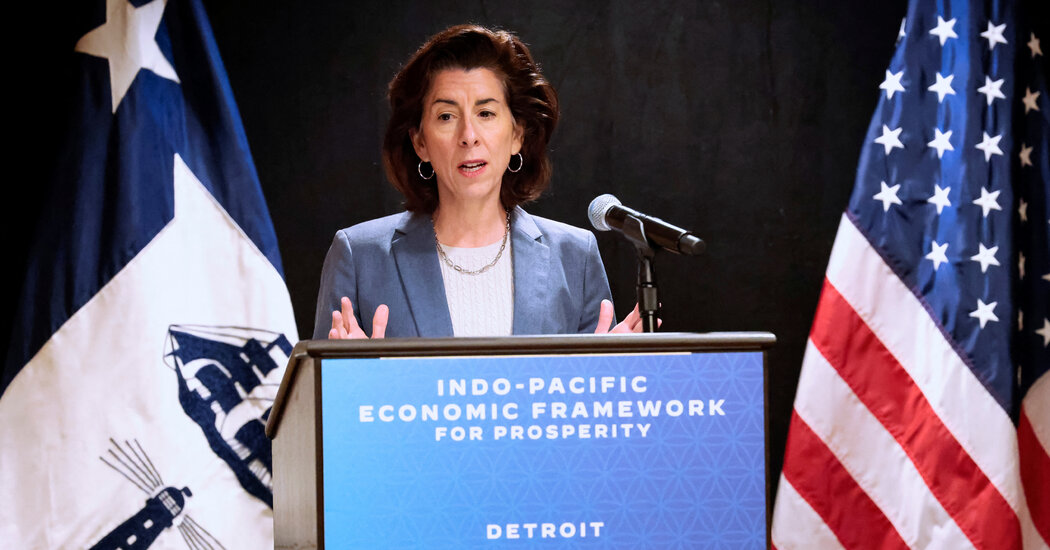The Biden administration announced on Saturday that it had reached an agreement with 13 other countries in the Indo-Pacific region to coordinate supply chains, in an effort to reduce the countries’ dependence on China for critical products and enable them better withstand crises such as wars. pandemics and climate change.
The supply chain deal is the first outcome of the government’s trade initiative in the region, dubbed the Indo-Pacific Economic Framework. Negotiations on the other three pillars of the agreement, aimed at facilitating trade and improving conditions for workers, expanding the use of clean energy, reforming tax structures and fighting corruption, continue .
Gina Raimondo, the Commerce Secretary, said the supply chain deal would deepen America’s economic cooperation with partners in the Indo-Pacific region, help US companies do business there and make the United States more competitive globally.
“The bottom line is that this is about increasing the US economic presence in the region,” she told reporters Thursday.
But prominent business groups expressed reservations about the Indo-Pacific deal, and on Friday more than 30 of them sent a public letter to the government saying the negotiations left out traditional US trade priorities that could help US exporters. That included lowering tariffs on their goods, but also limiting other regulatory barriers to trade and instituting stronger intellectual property protections.
The Biden administration says previous trade deals with those provisions have encouraged outsourcing and harmed American workers. Business leaders argue that without them, the Indo-Pacific deal will ultimately have little impact on the way these countries do business.
Regulatory barriers to trade are undermining efforts to strengthen supply chains, potentially undermining the effectiveness of the administration’s new agreement, the business groups’ letter said. It also expressed concern that the administration was not pushing for digital trading rules.
“We are increasingly concerned that the content and direction of the government’s proposals for the talks not only risk failing to deliver meaningful strategic and commercial outcomes, but also jeopardize U.S. trade and economic interests in the Indo-Pacific. endangering the region and beyond,” the letter said. , which was signed by the U.S. Chamber of Commerce, National Association of Manufacturers, Business Roundtable and other groups.
In remarks Saturday in Detroit, where she met with trade ministers from participating countries, Ms Raimondo said the group’s characterization of the deal was “plainly wrong and simply reflected a misunderstanding of what the IPEF is and what it is not it.”
The United States began negotiations on a more traditional Pacific trade agreement called the Trans-Pacific Partnership during the Obama administration. The deal was designed to strengthen America’s commercial ties in the Pacific, acting as a bulwark for China’s growing influence in the region. It lowered tariffs on auto parts and agricultural products and provided stronger intellectual property protection for pharmaceuticals, among many other changes.
But the Trans-Pacific Partnership caused deep divisions among Republicans and Democrats alike, with some politicians in both parties claiming it would erode American industry. Former President Donald J. Trump withdrew the United States from that deal, and Japan, Australia and other members implemented the agreement without the United States.
The Indo-Pacific Framework includes some of the same countries as the Pacific deal, as well as India, Indonesia, Korea, the Philippines and Thailand. But the Biden administration argues that the agreement is intended to better protect American workers and the environment.
“The IPEF is not a traditional trade agreement,” said Katherine Tai, the US trade representative, in Detroit on Saturday. “It’s our vision, our new vision of how our economies can work together to create real opportunities for our people.”
“We’re not just trying to maximize the efficiency of globalization,” Ms. Tai added. “We try to promote sustainability, resilience and inclusiveness.”
Ed Gresser, the director for trade and world markets at the Progressive Policy Institute, said allies such as Japan participated in the new deal but were still trying to convince the United States to rejoin the Trans-Pacific Partnership.
There is international goodwill towards the Biden administration, added Mr. Gresser, but also confusion about what a trade deal would mean without market access.
Countries have a long history of creating trade and investment frameworks that fall short of traditional trade agreements, he said, but “they are generally not seen as very ambitious.”

